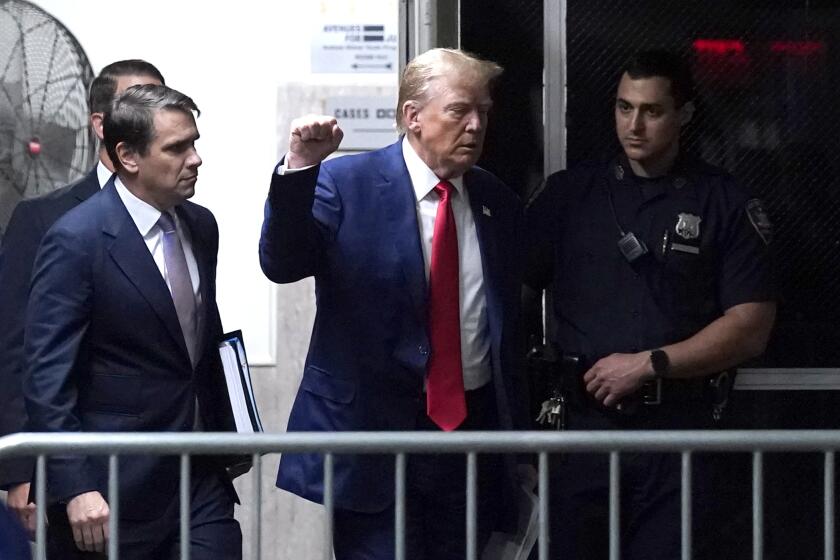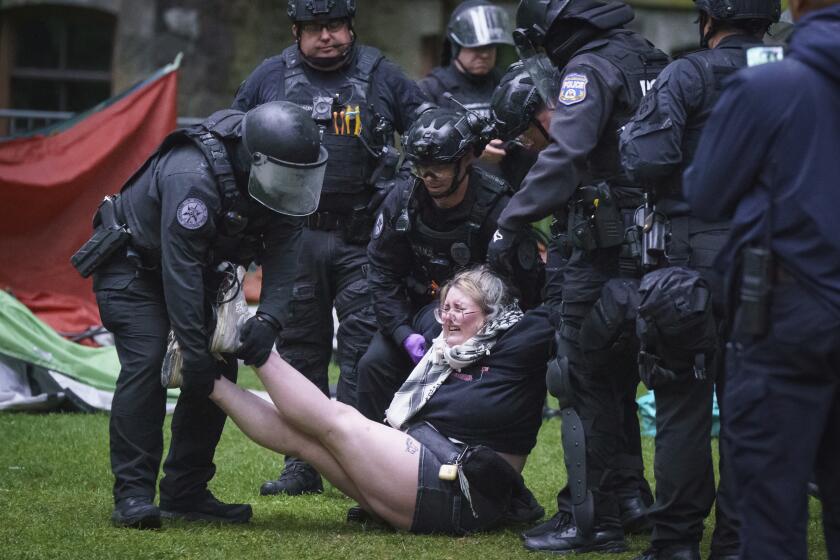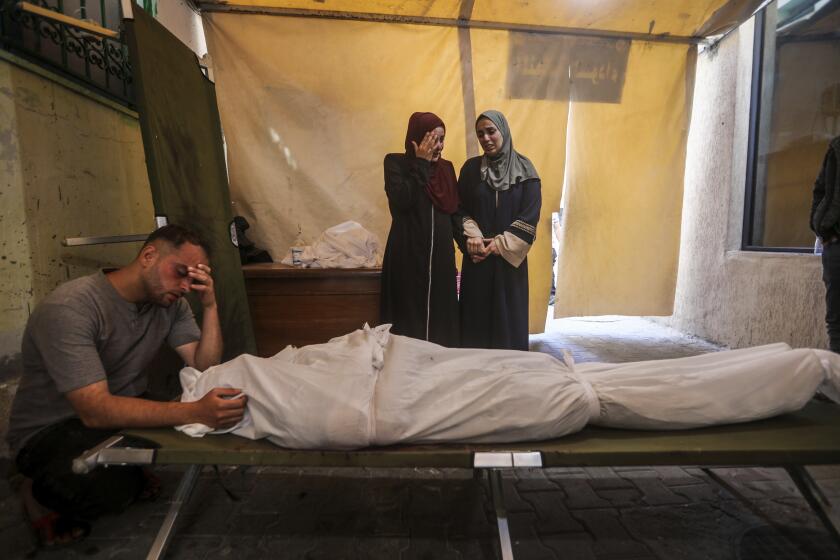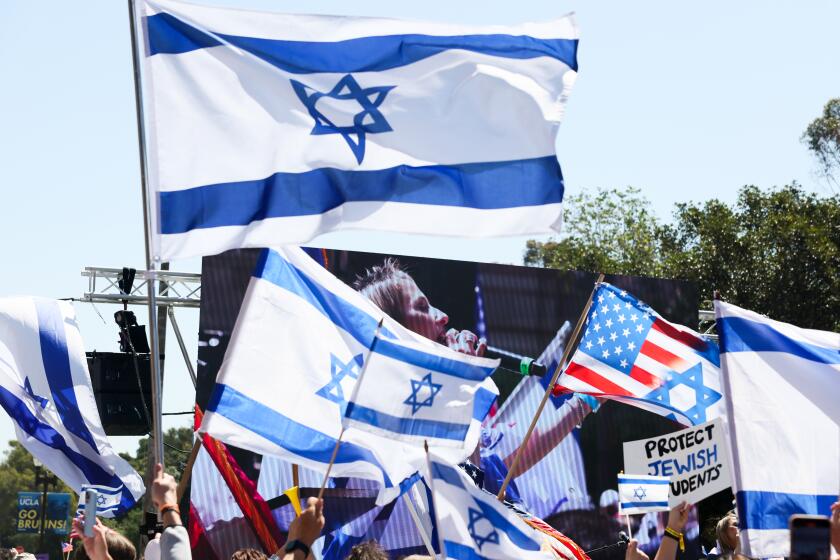U.S. Rushes in Aid to Panama Government
Shaken by the lawlessness and chaos still plaguing Panama more than two days after Wednesday’s U.S. invasion, Bush Administration officials have mounted a hurried but massive effort to help organize and put in place a government for that nation’s new president, Guillermo Endara.
Although concerned that too much U.S. involvement will cause Endara to be viewed as a puppet, Administration officials dispatched political advisers as well as communications equipment, transportation and other material aid to help him.
“The State Department has sent down some civic-affairs types to give political advice,” a senior aide to President Bush said, “and we’re doing what we can to facilitate him in putting things back together as quickly as possible.”
Restoring law and order and breathing life into Endara’s embryonic government, which has supplanted the regime of ousted strongman Manuel A. Noriega, have quickly moved to the top of the list of challenges facing the Administration in Panama. The two problems are now considered even more important than capturing the elusive Noriega, which originally was one of the main objectives of the U.S. assault.
Administration officials said problems caused by roving bands of pro-Noriega Dignity Battalion youths and the disabled Panama Defense Forces have created substantially greater complications than were envisioned in planning the invasion. Under Noriega, the Defense Forces served as the country’s police force as well as its military.
The Administration had not anticipated either the extent of resistance mounted by the Dignity Battalion or the almost complete disintegration of the Defense Forces.
Moreover, it has become clear that U.S. occupation forces will remain in Panama much longer than Administration officials originally expected. Although the timetable is uncertain, U.S. troops certainly will be there much longer than the month that Endara said he thought it would take to bring enough stability to allow his government to operate without U.S. military support.
A senior Bush aide pointed out that after the Oct. 25, 1983, invasion of Grenada, “it took three months to get things up and running so troops could leave, and that was much simpler because there was nothing left there in the way of a Grenada military.”
Elements of the main U.S. invasion force began pulling out of Grenada about six weeks after invading, but an American peacekeeping force continued to patrol the tiny Caribbean country until June 12, l985.
Administration officials have tried to be discreet about the extent of the role they are playing in forming the Panamanian government--a sensitive subject bound to further strain relations with Latin American countries that already have protested the U.S. invasion vehemently.
But Army Lt. Gen. Thomas W. Kelly, director for operations for the Joint Chiefs of Staff, in telling reporters that Panama’s foreign, finance and health ministries had been seized, declared: “We have ministries that are cleared and hope to have ministers appointed soon and have them operating.”
Realizing the import of his words, Kelly quickly added, “When I say ‘we,’ I mean the Endara government.”
Adm. William J. Crowe Jr., former chairman of the Joint Chiefs of Staff, was even blunter in a television interview:
“It would be disastrous to withdraw prematurely before we have put a stable government in place and a democratic government, and that is our main objective,” he said.
President Bush, in a letter to House Speaker Thomas S. Foley (D-Wash.) and Senate President Pro Tempore Robert C. Byrd (D-W.Va.), said that while most organized opposition to U.S. forces has ceased, “it is not possible at this time to predict the precise scope and duration of the military operations or how long the temporary increase of U.S. forces in Panama will be required.”
Bush said the letter was part of his effort to keep Congress informed “consistent with the War Powers Resolution,” which Congress passed during the Vietnam War era to give it a role in the deployment of combat troops.
Lt. Gen. Kelly of the Joint Chiefs said the Panama Defense Forces have been “pretty well neutralized” and that mopping-up operations are under way. Even so, he said, “They are not easy.”
Kelly noted that Panama City is an old city with a metropolitan population of 1 million and “a lot of places to hide.” He said the mopping-up operations would take five to 10 days to complete.
“We took a look at some history and found out that that is not an unrealistic number,” he said. “It took us about 10 days some years ago to clear Detroit when we had a functioning government and police department, which we don’t have in Panama right now.” He was referring to the Detroit race riots of 1967, when military forces were called in to restore order.
Some members of Congress expressed concern that the prominent U.S. role in setting up the Endara government, as well as the prospect of prolonged American military operations in Panama, will severely damage relations with other Latin American countries.
After a closed-door Defense Department briefing on Capitol Hill, Sen. Sam Nunn (D-Ga.), chairman of the Armed Services Committee, said the United States should reduce its profile to avoid provoking anger or an anti-American backlash.
“I think it’s important that we not become a permanent occupying force in reality or in perception,” Nunn said.
Administration officials insisted that Endara has been moving fairly quickly to organize his government, setting up operations in the Legislative Assembly building and appointing a number of ministers.
They noted one positive step Friday: U.S. troops secured Panama’s Central Bank, the Finance Ministry, the Health Ministry and the Foreign Ministry in addition to the Legislative Assembly building.
“We’re particularly concerned about the Central Bank and the Finance Ministry because they now can begin dealing with the money that will be needed for the economic development of the country,” White House Press Secretary Marlin Fitzwater said.
An initial allotment of $100,000 has been released to Endara by the U.S. Treasury from an escrow account that was set up some time ago in connection with anti-Noriega sanctions imposed by Washington. The account, now containing an estimated $400 million, consists primarily of tolls from Panama Canal users that were withheld from Noriega’s regime.
Although providing Endara with funds may help, U.S. officials acknowledge that reconstituting the Panama Defense Forces has turned into a major problem that will require considerable time to solve.
U.S. officials had anticipated a relatively high level of institutional loyalty among PDF members after combat died down. But thus far, most PDF members who were not shot or captured have been sitting on the sidelines instead of answering a call to return to service.
In an effort to reactivate the basic police structure, the Endara government not only issued an announcement that all police should report for duty, but declared that those who answered the call would receive their salaries. Paychecks were not issued this week, and the pay offer was seen as an incentive to report.
“Those who are willing to serve this government are simply being asked to come in and report for duty,” said one U.S. official closely involved in the effort. “The new government is being pressed to restore police services in the city. They’re now trying hard to assemble a force there.
“I don’t think the new government is that concerned about (the loyalties of) traffic police and lower-level people in these services,” he added. “If high-ranking officials report for duty, I think they would check them out pretty carefully.”
Some American MPs have been helping to provide services, in an advisory capacity, until the Panamanians can do a head count and reorganize the police force.
Adding to their problems, officials have been unable to find or settle on a respected figure of authority to head the organization. U.S. defense officials said that at Endara’s request, Eduardo Herrera Hassan, a former PDF colonel, was flown from America to Panama. But a Bush aide said that it is uncertain whether Herrera would lead a restructured Panamanian military.
BACKGROUND
Much of the continuing resistance to U.S. forces in Panama City comes from remnants of so-called Dignity Battalions, civilian paramilitary bands organized by Manuel A. Noriega as a kind of personal militia. U.S. Army Gen. Maxwell Thurman, chief of the Southern Command, says that each battalion is composed of about 300 people, most of them young men, and that there may be up to half-a-dozen battalions, totaling about 1,800 people. In today’s Panama, Thurman says, elements of the battalions are operating in much smaller groups, of perhaps 10 or 12 people each. In some cases, they have been joined by members of Panama Defense Forces loyal to Noriega who have shed their uniforms and are now prowling the city in civilian clothing, Thurman said.
More to Read
Start your day right
Sign up for Essential California for news, features and recommendations from the L.A. Times and beyond in your inbox six days a week.
You may occasionally receive promotional content from the Los Angeles Times.






